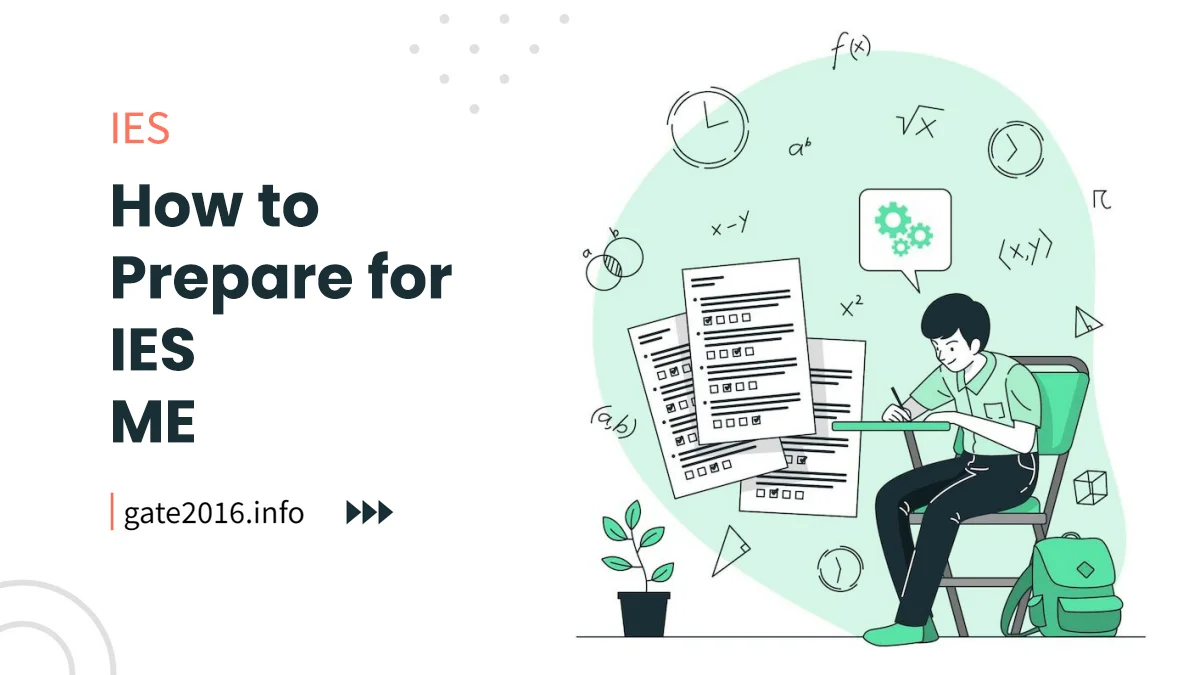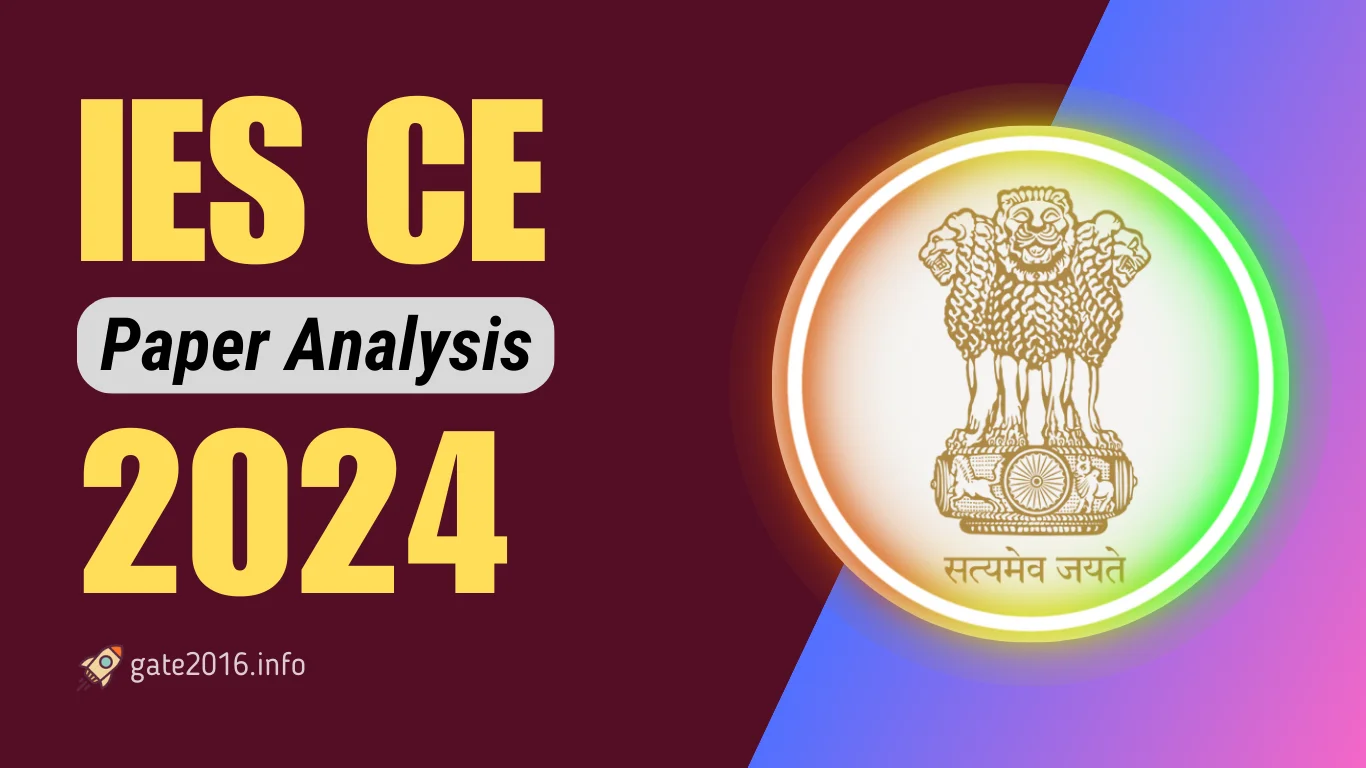Advertisements
Ratings

IES 2024 ME Preparation – The IES (Indian Engineering Services) Mechanical Engineering exam is a prestigious opportunity for engineering graduates to secure positions in various government departments and organizations.
For those aspiring to become mechanical engineers, the IES exam opens doors to a fulfilling career in the public sector.
This comprehensive guide provides you with a step-by-step approach to prepare for the IES Mechanical Engineering exam and excel in this competitive endeavor.
Contents
- 1. Understanding the Significance of IES Mechanical Engineering
- 2. IES Mechanical Engineering Syllabus Overview
- 3. Understanding the IES Exam Pattern
- 4. Creating a Well-Structured Study Plan
- 5. Selecting Appropriate Study Materials
- 6. Mastering Core Mechanical Engineering Concepts
- 7. Enhancing Problem-Solving Skills
- 8. Reviewing Past Years’ Question Papers
- 9. Taking Mock Tests
- 10. Effective Time Management Strategies
- 11. Implementing Revision Techniques
- 12. Staying Updated with Engineering Trends
- 13. Coping with Exam Stress
- 14. Final Weeks’ Preparation Strategy
- 15. Approaching Exam Day
- 16. Post-Exam Analysis and Next Steps
- Conclusion: Excelling in IES Mechanical Engineering
- Additional Resources and References
- IES Mechanical Engineering Guidance
- IES Mechanical Engineering Preparation FAQs
- IES Total Information & Guidance
1. Understanding the Significance of IES Mechanical Engineering
The IES Mechanical Engineering exam holds immense significance for individuals aiming to establish a successful career in the government sector.
It not only offers job stability but also provides opportunities to contribute to critical infrastructure projects and technological advancements.
2. IES Mechanical Engineering Syllabus Overview
The IES Mechanical Engineering syllabus encompasses various subjects, ranging from thermodynamics to machine design. Here’s a breakdown of the main subjects and key topics:
Table 1: IES Mechanical Engineering Syllabus Breakdown
| Subject | Key Topics |
|---|---|
| Thermodynamics | Laws, Cycles, and Applications |
| Fluid Mechanics | Properties, Bernoulli’s Equation, Flow Visualization |
| Mechanics of Materials | Stress, Strain, Deformation, and Failure |
| Machine Design | Design Principles, Gear Design, Bolted Joints |
| Heat Transfer | Conduction, Convection, Radiation |
| Manufacturing Processes | Casting, Machining, Welding |
3. Understanding the IES Exam Pattern
Before delving into preparation, it’s essential to understand the IES exam pattern:
- Preliminary Examination: The preliminary exam consists of objective papers (General Studies and Engineering Aptitude) and an Engineering Paper.
- Main Examination: The main exam comprises conventional papers focusing on specific engineering disciplines.
- Personal Interview and Personality Test: Shortlisted candidates from the main exam are called for an interview to assess their personality and suitability for the role.
4. Creating a Well-Structured Study Plan
Developing a well-structured study plan forms the foundation of efficient preparation:
- Self-Assessment: Identify your strengths and weaknesses in different subjects.
- Study Schedule: Create a daily or weekly schedule, allocating time for each subject.
- Regular Practice: Dedicate time to solving practice problems and revising concepts.
- Mock Tests: Include regular mock tests to gauge your progress and improve time management.
Table 2: Sample Study Plan
| Week | Subjects/Topics | Time Allocation |
|---|---|---|
| 1-2 | Thermodynamics | 10 hours/week |
| 3-4 | Fluid Mechanics | 12 hours/week |
| 5-6 | Mechanics of Materials | 10 hours/week |
| 7-8 | Machine Design | 8 hours/week |
5. Selecting Appropriate Study Materials
Choosing the right study materials is pivotal for comprehensive learning:
Table 3: Recommended Study Resources
| Subject | Books | Online Resources |
|---|---|---|
| Thermodynamics | “Engineering Thermodynamics” by P.K. Nag | NPTEL’s Mechanical Engineering Courses |
| Fluid Mechanics | “Fluid Mechanics” by Frank M. White | Coursera’s Fluid Mechanics Courses |
| Mechanics of Materials | “Mechanics of Materials” by R.C. Hibbeler | edX’s Strength of Materials Course |
| Machine Design | “Design of Machine Elements” by V.B. Bhandari | MIT OpenCourseWare Machine Design |
| Heat Transfer | “Heat and Mass Transfer” by Yunus A. Çengel | Khan Academy’s Heat Transfer |
| Manufacturing Processes | “Manufacturing Processes” by P.N. Rao | YouTube Lectures on Manufacturing |
6. Mastering Core Mechanical Engineering Concepts
Strengthening your understanding of core mechanical engineering concepts is crucial:
- Thermodynamics: Grasp the laws, cycles, and applications.
- Fluid Mechanics: Understand properties, Bernoulli’s equation, and flow visualization.
- Mechanics of Materials: Familiarize yourself with stress, strain, deformation, and failure.
7. Enhancing Problem-Solving Skills
Consistent practice of problem-solving hones your skills:
- Diverse Problem Sets: Solve problems of varying complexity to refine your problem-solving abilities.
- Real-World Application: Apply mechanical engineering principles to practical scenarios for deeper insight.
8. Reviewing Past Years’ Question Papers
Solving previous years’ question papers offers valuable insights:
Table 4: Benefits of Solving Past Years’ Papers
| Benefit | Description |
|---|---|
| Identify Question Patterns | Recognize recurring question types |
| Time Management | Practice managing time during the exam |
| Focus on Key Topics | Understand distribution of questions |
| Self-Assessment | Evaluate your level of preparedness |
9. Taking Mock Tests
Mock tests simulate exam conditions and help assess your readiness:
Table 5: Benefits of Taking Mock Tests
| Benefit | Description |
|---|---|
| Simulate Exam Conditions | Experience time constraints and exam pressure |
| Time Management | Enhance time allocation for each section |
| Performance Analysis | Identify strengths and weaknesses |
| Build Confidence | Boost self-assurance before the exam |
10. Effective Time Management Strategies
Strategic time management during the exam is vital:
Table 6: Time Management Strategy
| Section | Recommended Time Allocation |
|---|---|
| General Studies and Engineering Aptitude | 2 hours |
| Engineering Paper | 3 hours |
| Conventional Papers | Varies by paper |
11. Implementing Revision Techniques
Regular revision ensures retention of information:
- Structured Revision: Allocate time for revisiting key concepts.
- Summary Notes: Create concise notes for quick review before the exam.
12. Staying Updated with Engineering Trends
Stay informed about the latest developments and trends in engineering:
- Engineering Journals: Subscribe to reputable journals for recent research and advancements.
- Industry News: Read engineering magazines, news, and online sources to stay informed.
13. Coping with Exam Stress
Effective stress management enhances performance:
- Relaxation Techniques: Practice meditation, deep breathing, and relaxation exercises.
- Healthy Lifestyle: Incorporate physical activity, balanced nutrition, and breaks into your routine.
14. Final Weeks’ Preparation Strategy
Focus intensively on challenging topics in the final weeks:
- Intense Revision: Allocate more time to topics that require further understanding.
- Additional Mock Tests: Take extra mock tests to refine your preparation.
15. Approaching Exam Day
Approach the exam day with confidence:
- Read Instructions: Thoroughly read and understand exam instructions.
- Time Allocation: Plan your time for each section before starting the paper.
16. Post-Exam Analysis and Next Steps
Evaluate your performance and plan for the future:
- Performance Evaluation: Analyze your strengths and areas for improvement.
- Future Plans: Consider advanced studies or career opportunities based on your results.
Conclusion: Excelling in IES Mechanical Engineering
By adhering to the comprehensive strategies outlined in this guide, aspiring mechanical engineers can establish a robust preparation plan for the IES Mechanical Engineering exam.
Success in this exam not only opens doors to rewarding career opportunities but also contributes to the nation’s technological progress.
Additional Resources and References
Explore the recommended textbooks, online courses, and practice papers mentioned in this guide for additional study materials and references.
These resources will further enhance your understanding and preparation for the IES Mechanical Engineering exam.
IES Mechanical Engineering Guidance
- How to Prepare for IES Mechanical Engineering: A Comprehensive Guide
- IES ME Syllabus 2024: Prelims and Mains
- IES ME Subjective Papers – (2023-1985)
- [PDF] IES ME Objective Papers – (2023-2000)
- IES ME Books 2024: Prelims and Mains
IES Mechanical Engineering Preparation FAQs
IES Mechanical Engineering is a competitive examination conducted by the Union Public Service Commission (UPSC) in India. It is part of the Indian Engineering Services (IES) examination. IES ME assesses candidates' knowledge and skills in mechanical engineering and is conducted to recruit engineers for various government departments and organizations. Key subjects to focus on include thermodynamics, fluid mechanics, heat transfer, engineering mechanics, materials science, manufacturing processes, and machine design. The IES ME syllabus covers a wide range of topics in mechanical engineering. Effective preparation involves a comprehensive approach: Yes, some recommended books and resources include: IES ME consists of a written examination followed by an interview. The written examination typically comprises two papers—Paper I (Objective) and Paper II (Conventional). Paper I consists of multiple-choice questions, while Paper II involves descriptive answers. To approach it effectively, practice time management, work on problem-solving skills, and focus on both theoretical and practical aspects of mechanical engineering. Additionally, prepare for the interview by revising core concepts and staying updated with industry developments.What is IES Mechanical Engineering (ME)?
What are the important subjects to focus on for IES Mechanical Engineering preparation?
How should I prepare for the IES Mechanical Engineering exam?
Are there any recommended books or resources for IES Mechanical Engineering preparation?
What is the exam pattern for IES Mechanical Engineering, and how should I approach it?
Recent Posts
- IES 2024 Expected Cut-off Marks: Prelims and Mains
- How to Prepare for IES Electrical Engineering: A Comprehensive Guide
- How to Prepare for IES Electronics Engineering: A Comprehensive Guide
- IES 2024 Vacancy – Branch-wise and Category-wise Distribution
Related Tags
How to prepare for ies mechanical engineering pdf 2024, ies preparation strategy for ece 2024, ies exam preparation books 2024, how to prepare for ese without coaching 2024, ies mechanical syllabus 2024, ies preparation strategy for civil 2024, is ies tougher than jee 2024, ese preparation strategy 2024
| IES/ESE GS & EA Books |
| IES/ESE Guide Books |
IES Total Information & Guidance
Click below given links to get further information.



